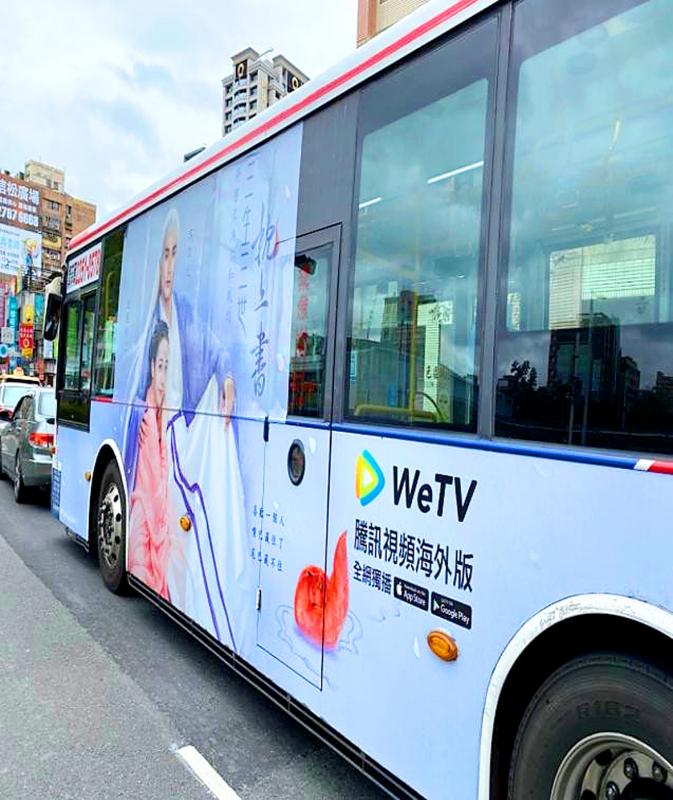Telecoms and Internet service providers (ISPs) that fail to comply with government regulations to block broadcasts from illegal over-the-top (OTT) service operators from China could face a fine of up to NT$5 million (US$1.69 million), according to a draft Internet audiovisual service management act passed by the National Communications Commission (NCC) yesterday.
Details of the draft act are scheduled to be announced next week after the wording of its articles is reviewed by NCC commissioners, it said, adding that the act would be subject to a 60-day public review period afterward.
Regarding Chinese Internet audiovisual service operators that operate in Taiwan illegally without securing permission in accordance with the Act Governing Relations Between the People of the Taiwan Area and the Mainland Area (臺灣地區與大陸地區人民關係條例), the draft act states that Taiwanese telecoms and ISPs should not offer them telecommunication service or equipment, data center services, content delivery network services or cloud services, the commission said.

Photo courtesy of a reader
They should also comply with government regulations to block the broadcast of Chinese operators’ content in the nation, it added.
Industry observers said that the draft act specifically targets Chinese OTT operators iQiyi.com (愛奇藝) and Tencent Video (騰訊視頻), which the Mainland Affairs Council (MAC) had ruled as illegal audiovisual service operators based on the act regulating cross-strait affairs.
Although operating illegally in Taiwan, iQiyi has about 6 million subscribers across the nation, they said.
The nation’s ISPs and other relevant service providers must not help OTT operators transmit content so long as the MAC deems them as contravening the cross-strait act, NCC spokesperson Hsiao Chi-hung (蕭祈宏) said.
Those assisting them in doing so could face a fine of NT$500,000 to NT$5 million, he said.
Meanwhile, the draft act would require OTT operators with large-scale operations or significant market influence to register with the government, which would make public the names of the operators, the commission said.
Operators that fail to register with the government after their names are publicized would be fined between NT$100,000 and NT$1 million, it added.
In addition, OTT operators that have registered with the government would be obligated to regularly report key business information to the NCC, from the number of subscribers they have to their sales revenue, the commission said.
They must join or form an OTT service association and follow the ethical guidelines set by the association, it added.
“The OTT operators must annually disclose the percentages of local content on their platforms that are produced by themselves or through partnerships with local content providers. The Ministry of Culture would determine the subsidies and other incentives available to them based on the disclosed percentages,” the commission said.

DAREDEVIL: Honnold said it had always been a dream of his to climb Taipei 101, while a Netflix producer said the skyscraper was ‘a real icon of this country’ US climber Alex Honnold yesterday took on Taiwan’s tallest building, becoming the first person to scale Taipei 101 without a rope, harness or safety net. Hundreds of spectators gathered at the base of the 101-story skyscraper to watch Honnold, 40, embark on his daredevil feat, which was also broadcast live on Netflix. Dressed in a red T-shirt and yellow custom-made climbing shoes, Honnold swiftly moved up the southeast face of the glass and steel building. At one point, he stepped onto a platform midway up to wave down at fans and onlookers who were taking photos. People watching from inside

A Vietnamese migrant worker yesterday won NT$12 million (US$379,627) on a Lunar New Year scratch card in Kaohsiung as part of Taiwan Lottery Co’s (台灣彩券) “NT$12 Million Grand Fortune” (1200萬大吉利) game. The man was the first top-prize winner of the new game launched on Jan. 6 to mark the Lunar New Year. Three Vietnamese migrant workers visited a Taiwan Lottery shop on Xinyue Street in Kaohsiung’s Gangshan District (崗山), a store representative said. The player bought multiple tickets and, after winning nothing, held the final lottery ticket in one hand and rubbed the store’s statue of the Maitreya Buddha’s belly with the other,

‘NATO-PLUS’: ‘Our strategic partners in the Indo-Pacific are facing increasing aggression by the Chinese Communist Party,’ US Representative Rob Wittman said The US House of Representatives on Monday released its version of the Consolidated Appropriations Act, which includes US$1.15 billion to support security cooperation with Taiwan. The omnibus act, covering US$1.2 trillion of spending, allocates US$1 billion for the Taiwan Security Cooperation Initiative, as well as US$150 million for the replacement of defense articles and reimbursement of defense services provided to Taiwan. The fund allocations were based on the US National Defense Authorization Act for fiscal 2026 that was passed by the US Congress last month and authorized up to US$1 billion to the US Defense Security Cooperation Agency in support of the

HIGH-TECH DEAL: Chipmakers that expand in the US would be able to import up to 2.5 times their new capacity with no extra tariffs during an approved construction period Taiwan aims to build a “democratic” high-tech supply chain with the US and form a strategic artificial intelligence (AI) partnership under the new tariffs deal it sealed with Washington last week, Taipei’s top negotiator in the talks said yesterday. US President Donald Trump has pushed Taiwan, a major producer of semiconductors which runs a large trade surplus with the US, to invest more in the US, specifically in chips that power AI. Under the terms of the long-negotiated deal, chipmakers such as Taiwan Semiconductor Manufacturing Co (TSMC, 台積電) that expand US production would incur a lower tariff on semiconductors or related manufacturing